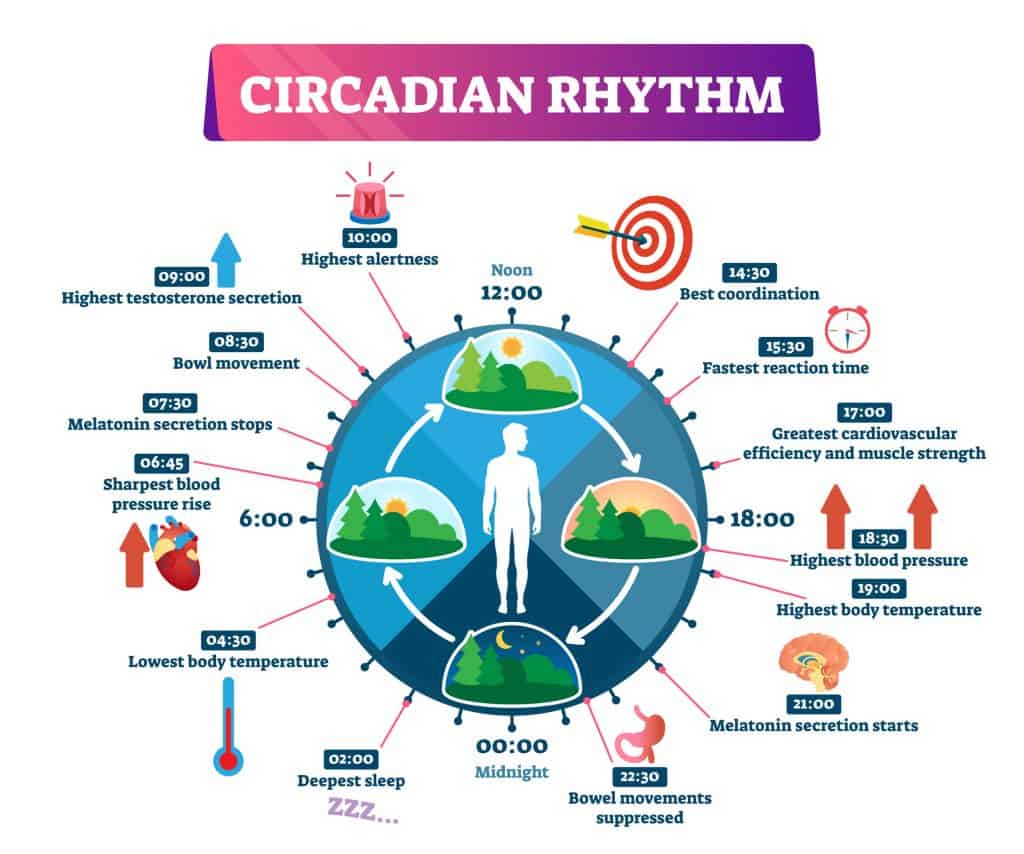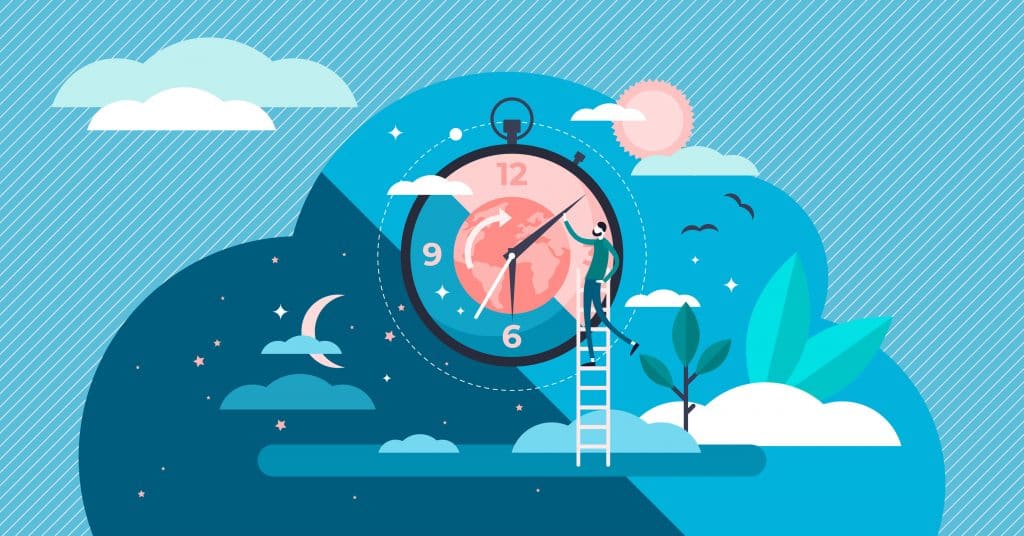What is Circadian Rhythm? – Disorders, Symptoms, Health Effects
Posted by Prescription Hope - See Editorial Guidelines (Last Updated On: Wed Apr 26 2023)
Knowing what circadian rhythm is and how it affects your health can be beneficial for you to maximize your well-being.
Here is a short answer as to what circadian rhythm is and how it may affect your health.
What is Circadian Rhythm? In short, circadian rhythm is described as the daily cycle of physical and mental behaviors, such as sleeping and eating patterns. Biological clocks are responsible for producing circadian rhythms. The disruption of circadian rhythms has been found to have adverse effects on one’s health.

So, in this article, we will cover everything you should know about circadian rhythm, including how it affects you, the disorders associated with it, and how to normalize your circadian rhythm.
What is Circadian Rhythm?

Circadian rhythm is a person’s mental, physical, and behavioral pattern within a 24-hour period. Most living organisms, including animals and plants, have a circadian rhythm. How a person responds to light and darkness largely impacts this area of our lives.
Your circadian rhythm plays a significant role in when you sleep, and when you naturally wake up.
In short, this is your body’s internal clock that works to stimulate you to do something at the appropriate time. A small portion of the brain called the suprachiasmatic nucleus is the part of the brain that controls the internal clock.
Your body will respond to darkness. The body senses the lack of light and thinks that it’s nighttime, and it is time to sleep soon. Therefore, as the sun goes down, you may notice yourself become tired.
The main reason for this has to do with light. The sun produces blue light in the morning and blue light signals to your body that it is time to get up. However, our phones and computer screens also emit blue light. This tends to be bad for our circadian rhythm.
The reason is that we often look at our phones or watch tv just before going to bed. In doing that, you just exposed yourself to blue light, which again, is signaling your body to wake up. Therefore, many of us find it difficult to fall asleep right away when we crawl into bed.
How Circadian Rhythm Impacts Health
Circadian rhythm can have significant impacts on your health. If the circadian rhythm is disrupted, then it can have negative effects on health. If the rhythm is normalized, then you can gain health benefits from it.
The circadian rhythm affects when our blood pressure, cortisol, and other hormone levels rise and drop. Due to this, doctors may prescribe some medications to be taken at certain times in the day to match up with your circadian rhythm.
Our bodies are designed to run in line with the rising and setting of the sun. So, as the sun sets, we begin to become more relaxed, and our blood pressure and cortisol levels begin to drop.
Common Circadian Rhythm Disorders and Causes
Being out of sync with your circadian rhythm can affect your mental and physical health. It can leave you feeling tire, unalert, with increased hunger, and susceptible to health conditions.
Here is a list of circadian rhythm disruptors.
- Jet Lag – Jet lag occurs after you have traveled across time zones. It can leave you feeling tired and out of sync. The time in which your body is used to the sun going down is either earlier or later. You may begin to have insomnia, digestive problems, and headaches for a few days following jet lag.
- Shift Work – People that work night shifts may struggle to get enough sleep because of irregular sleeping patterns. This may include insomnia during the day and struggling to stay awake through the night at work.
- Altered Sleep Phases – Four phases of altered sleep affect circadian rhythm, which are as follows.
- Delayed Sleep Phase: This is a sleep pattern that is delayed by a couple of hours. For example, a person may not go to sleep until 2 or 3 in the morning and sleep till 10 a.m. Adolescents are most known for this sleep phase.
- Advanced Sleep Phase: This is when a person goes to bed much earlier and wake up much earlier than most people. This phase is common among elderly individuals.
- Irregular Sleep Phase: This phase is when a person’s sleep is so irregular that they are taking multiple naps throughout a 24-hour period. There is no consistency in their sleep pattern.
- Non-24-H Sleep Phase: This is when a person may go to sleep later and later or wakes up later and later every day. The times in which they go to sleep and wake up, are not consistent. Those that are blind may experience this the most.
Symptoms of Circadian Rhythm Disorder
The following is a list of circadian rhythm disorder symptoms.
- Difficulty falling asleep or staying asleep
- Daytime sleepiness or sleepiness during shift work
- Feeling fatigued or exhausted
- Difficulty concentrating
- Decreased alertness
- Lack of control over emotions and mood
- Headaches
- Digestive problems
Eating in Sync with your Circadian Rhythm

Eating in sync with your circadian rhythm is crucial for improving your health. If a person eats out of sync of this rhythm, then they may be at a higher risk for cardiovascular, diabetes, and obesity.
Firstly, merely eating at unusual times can cause a disruption to your circadian rhythm and biological clock. This can affect a person’s sleep, as well as how the body digest and metabolizes the food.
Insulin plays a significant role in adjusting the circadian rhythm in cells and tissues when we eat. Insulin stimulates the production of a protein known as Period (PER), which determines the period length of circadian rhythms.
Therefore, when insulin is at work during abnormal times, this disrupts the body’s biological clock. This means that eating when the body is supposed to be resting will cause there to be less distinction between daytime and nighttime.
A study of mice determined that eating whenever you want without regard to your biological clock can lead to metabolism disorders. This includes obesity, which can lead to type 2 diabetes and hyperlipidemia, which is high levels of fat proteins in the blood.
Ultimately, eating in sync with your circadian rhythm can reduce the risk of having type 2 diabetes, cardiovascular disease, and other metabolism disorders. To ensure the healthiest lifestyle, consider the times you are eating and what you can do to normalize your patterns.

Treating Disruption of Circadian Rhythm
Treating the disruption of, or normalizing, your circadian rhythm can take some work and discipline on your part. Here are some steps you can take to reset your internal clock and treat circadian rhythm disorders.
1. Manipulate Light
Manipulating light is one way to help normalize your circadian rhythm. Light, mainly blue light, is highly responsible for signaling to the body when it should be awake and when it should be asleep. Blue light is found naturally at the brightest parts of the day, as it is produced by the sun. Therefore, natural blue light during the day is good, but artificial blue light, especially at night, is bad for the circadian rhythm.
You can manipulate light for your advantage. For example, if you live in an area like Seattle, where sun exposure is at a minimum, you can use artificial blue light during the day to normalize your biological clock. This may include bright light therapy and using certain light lamps that mimic sunlight.
On the other spectrum, avoiding the use of technologies 2 hours prior to going to bed can help your sleep cycle. This will prevent natural melatonin levels from being suppressed. Removing artificial lights in the bedroom while you’re sleeping can also be beneficial.
2. Fast and Normalize Mealtimes
As mentioned earlier, eating in sync with the body’s circadian rhythm can help you treat a disruptions of the circadian rhythm. If you are traveling across time zones and jet-lagged, then you may need to fast to bring your internal clock back into rhythm.
Intermittent fasting has been shown to help with normalizing your circadian rhythm. Intermittent fasting is only eating within a specified period and fasting the other hours of the day. By doing this, you are allowing your digestive system to repair itself and helping normalize blood sugar and insulin levels.
3. Get Close to Nature
Spending more time in nature may seem odd at first, but there are studies to suggest that this can help with circadian disruptions. By going out in nature and camping, you start living the way the body was designed to live.
If you are camping and the sun goes down, you’ll have a fire going, and you won’t be out working. Your body will sense the light change and temperature change, signaling that it is time to rest. In the morning, you will wake up to natural sunlight, indicating to the body that it is time to get up.
Ultimately, camping and spending time in nature may have beneficial effects for treating disruptions of the biological clock.
4. Planned Sleep Deprivation

Planned sleep deprivation is not something that is often recommended. However, it can quickly normalize circadian rhythms.
It is important to note that sleep deprivation for no reason is not beneficial. In fact, chronic sleep deprivation can have serious health consequences.
What we are talking about is depriving oneself of sleep for a shorter period to help established a normalized cycle. For example, planned sleep deprivation may be necessary if you are jet-lagged. You may need to stay up a few more hours without sleep to get your circadian rhythm back on track with the rising and setting of the sun.
To do this, you should avoid taking a nap and strive to keep yourself busy until the goal bedtime.
5. Chronotherapy
Chronotherapy is described as making gradual changes regarding the time you go to bed or wake up. This requires behavioral changes.
Chronotherapy will be beneficial for those that have altered sleep phases. A person that is staying up till 2 a.m. should go to bed earlier and earlier each night until they reach their goal. This could be done in 30 minute or 1-hour increments each night.
For a person to do this, though, they need to make changes earlier on in their day. If they don’t, then they will struggle to get everything done before their goal bedtime.

Conclusion
The body’s Circadian rhythm is essential, and we must consider them when it comes to our overall health. If you are struggling with normalizing your sleep patterns and your biological clock, then consider implementing the steps above and talk to your doctor.
If you are struggling to afford your prescription medications, then Prescription Hope may be able to help. Enroll with us and pay just $60.00 a month through Prescription Hope’s medication access service for each medication if you are eligible.

